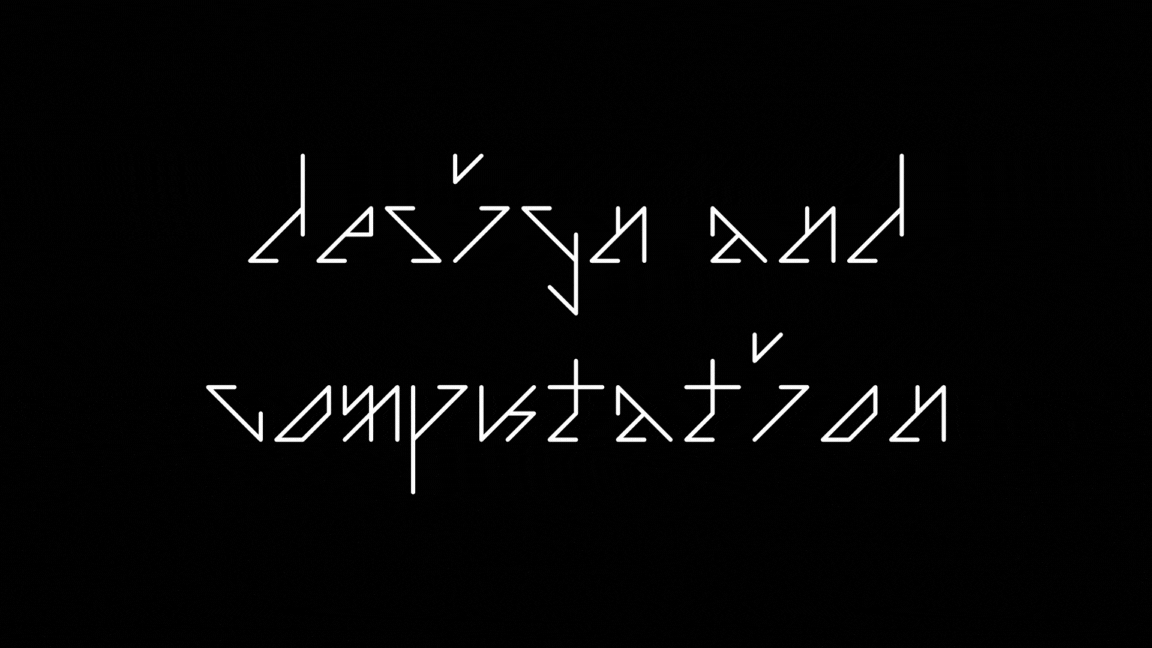
With the new joint master's program Design & Computation, the University of Arts Berlin arrow_outward and Technical University Berlin arrow_outward are responding to rapid social and technological change and an increasingly dynamic academic culture. Through this program, the two universities are working collaboratively across disciplines to develop new teaching and research formats. Students, teachers and researchers have access to an extensive range of research and educational opportunities from both Universities to analyse, critically reflect and create within a cutting edge, interdisciplinary environment.

○ Background
“In Order to understand the phenomena surrounding a new technology, we must open the question of design – the interaction between understanding and creation. In speaking here of design, we are not restricting our concern to the methodology of conscious design. We address the broader question of how a society engenders inventions whose existence in turn alters that society.” (Winograd, T., & Flores, F., 1988, Understanding Computers and Cognition: A New Foundation for Design)Since the turn of the last century, industrialized societies have been witnessing an ever-increasing penetration of far-reaching areas of public and private life by new technological applications that often stem from decades of basic research. This process has been taking place on a global scale and in accelerated innovation cycles, and it equally affects the social, economic, ecological and cultural conditions of societies: from the algorithmizing of everyday life and the digitalization of production and labor to public participation in decision-making processes to guaranteeing food security and overcoming the climate crisis.
Beyond the positive or negative confirmation of this trend, given its scale and infiltrating nature, fundamental questions are being asked in the humanities and social sciences, in design and in the arts as well as in public discourse – about represented political interests and the distribution of costs and benefits associated with technological progress, but also about the basic relationship between the individual, technology and society.
The “metatrend” of accelerated, digitally coordinated technologization also affects large areas of human productivity, including the engineering sciences (e.g. mechanical engineering, mechatronics, materials research, civil engineering), classical design disciplines (e.g. product and fashion design, visual communication, architecture, media design) and the arts. For the engineering sciences, the increasing impact on society as a whole raises entirely new questions about the social dimension of their innovations. At the same time, the classical design disciplines are faced with the challenge of incorporating new technologies and methods into existing practices at an increasing pace while subjecting them to critical review.In addition, the question of the social function in engineering and the growing importance of technical expertise in design are bringing the two disciplines ever closer together, creating overlaps and intersections and giving rise to hybrid (“emergent”) fields of study.
Against this backdrop – i.e. in view of the current rapid technological and social change as well as an increasingly dynamic academic landscape – the new Master’s program “Design & Computation”, which was established in a cooperation of the Berlin University of the Arts and the Technical University Berlin, is aimed at Bachelor graduates from the fields of design, art, engineering, natural sciences, humanities and social sciences. The program offers them the opportunity to contribute to pressing questions of our time in an interdisciplinary context and by drawing on the extensive expertise of both universities from diverse disciplines, each corresponding to the “cutting edge” of their respective fields.
○ Structure
The four-semester Master’s program, whose students come from different disciplines, begins with a customizable introductory semester that serves to develop a common thematic, discursive and methodological foundation.
The introductory semester is followed by two semesters of work in the studio “Design as Medial Practice”, which forms the center of the program. In the studio, students dedicate themselves to the exploring and exploiting of new technologies, media, materials and methods, their critical reflection and problem-oriented application in the frame of project-based teamwork and along an annually changing set of topics. The studio work takes place within the context of free drafts, visualizations on varying scales, literature work, concrete scientific experiments and other formats. The studio is supervised by lecturers from both universities, who provide expertise from the fields of design, engineering, the humanities, natural sciences and the arts. Parallel to the studio work, students take one of two elective modules, “Modelling and Simulation” or “Structures and Systems”, and thus deepen their respective fields of study. In addition, an extensive portfolio of elective subjects from both universities offers second- and third-semester students the opportunity to precisely adapt their studies to their own preference and interests.
The last semester of the Master’s program “Design & Computation” consists of the writing of a final thesis, optionally comprising a practical part. Students strive to obtain a Master of Arts (M.A.) with mention of their respective field of study and including the seals of both the Berlin University of the Arts and the Technical University Berlin.
Graduates of the Master’s program have specific competences in targeted research and self-information about current and future developments in various technical disciplines. They are trained in the application of new technologies in the design process and are able to critically examine central problems of an increasingly globalized and technologized world. Furthermore, they possess a flexible mindset that transcends disciplinary boundaries, enabling them to move confidently in transdisciplinary research contexts and to act as initiators and pioneers of public and private enterprises.
○ Contact
Universität der Künste Berlin
M.A. Design & Computation
c/o Präsident der UdK
Einsteinufer 43
10587 Berlin
info@design-computation.berlin
○ Contact Person
Prof. Albert Lang
apply@design-computation.berlin
○ Press
press@design-computation.berlin
○ Useful Info
○ Imprint
Text: Albert Lang
Typeface: based on various instances from the Letter Spirit project by Douglas Hofstadter and Gary McGraw
If you have any questions or suggestions regarding this page, please contact
info@design-computation.berlin
For questions about the application or to arrange a consultation (also possible online), please contact:
apply@design-computation.berlin